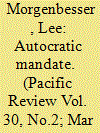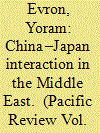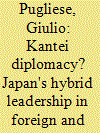|
|
|
Sort Order |
|
|
|
Items / Page
|
|
|
|
|
|
|
| Srl | Item |
| 1 |
ID:
151445


|
|
|
|
|
| Summary/Abstract |
This paper explains how authoritarian regimes employ flawed elections to obtain both short-term legitimacy and long-term stability. In conjunction with the use of co-optation and repression, it argues that ruling parties hold de jure competitive elections to claim what is termed autonomous legitimation. This denotes the feigning of conformity to the established rules of the constitution and the shared beliefs of citizens. Regardless of overall turnout and support, ruling parties exploit the normative and symbolic value of elections in order to establish moral grounds for compliance within a dominant-subordinate relationship. In support of this argument, the case of Singapore's People's Action Party (PAP) is analysed in historical and contemporary terms. Since 1959, the PAP has used precisely timed elections to extract one or more mandate types from citizens and, by extension, claim legitimacy. In particular, it has sort a mandate based on its response to an event, execution of a policy and/or collection of a reward. In the long run, autocratic stability has been achieved through a process of reciprocal reinforcement, which has combined autonomous legitimation with targeted co-optation and low intensity coercion. The paper concludes by addressing the generalisability of this finding for other authoritarian regimes in Southeast Asia.
|
|
|
|
|
|
|
|
|
|
|
|
|
|
|
|
| 2 |
ID:
151444


|
|
|
|
|
| Summary/Abstract |
As most studies on Middle East–East Asian relations focus on the interregional dimension, the manner in which relations between East Asian powers influence, and are influenced by, their policies in the Middle East are largely overlooked. Attempting to add another layer to the study of Sino-Japanese relations, this article explores whether Sino-Japanese rivalry extends to the Middle East. This undertaking requires a conceptual distinction between measures related to Sino-Japanese competition in the Middle East and measures which are related to their rivalry. Building on a minimal definition of interstate rivalry, the article argues that neither the effort to secure energy supply nor their economic or political competition there is shaped by their rivalry. The only field that can be associated with that rivalry is Japan's quasi-military activity in the Middle East, which may enhance its security policy's revision. That, in turn, causes much concern and criticism in Beijing, thus assigning the region a certain role in their relations.
|
|
|
|
|
|
|
|
|
|
|
|
|
|
|
|
| 3 |
ID:
151441


|
|
|
|
|
| Summary/Abstract |
How to understand and explain the evolutions as well as predict the future directions of bilateral relations between the United States and China has become an imperative task for both policy makers and academic scholars. Borrowing insights from neoclassical realism, this paper suggests a three-stage, perceptual model of ‘threat–interest’ to explore the dynamics of Sino–US relations from 1949 to 2015. It argues that the nature of US–China relations, either cooperation or competition, is mainly shaped by the perceptions of leaders regarding security threats and economic interests between the two nations. How to manage their perceptions regarding each other and how to find a balance between cooperation and competition are the key issues for leaders in both the United States and China to manage bilateral relations in the future. The next decade or two may be the best or the worst times for US–China relations.
|
|
|
|
|
|
|
|
|
|
|
|
|
|
|
|
| 4 |
ID:
151447


|
|
|
|
|
| Summary/Abstract |
There is a palpable sense of humility within the United Nations and other international institutions regarding peacebuilding. Rather than seeking to implement the liberal peace, they now pursue the more modest goal of ‘good enough’ outcomes. This shift reflects a growing consensus in the critical literature that space needs to be provided for the local agency that will ultimately determine the outcomes of peacebuilding. At first blush this emphasis on local agency is positive; it offers an important correction to the technocratic and generally top-down nature of liberal peacebuilding. But, is the ‘good enough’ approach to peacebuilding good enough? What are the pitfalls and potential of the local turn? This article uses a case study of Timor-Leste to answer these questions. It finds that the local turn can help lend legitimacy to the state and increase opportunities for political participation and the delivery of public goods at the local level. However, the emerging evidence from Timor-Leste also highlights the pitfalls of the local turn. Most significantly, the state can transfer responsibility for public goods provision to the local level in order to lessen the burden on the state and to divert attention from ineffective or illegitimate central institutions.
|
|
|
|
|
|
|
|
|
|
|
|
|
|
|
|
| 5 |
ID:
151442


|
|
|
|
|
| Summary/Abstract |
This article operationalizes Japanese leadership in foreign and security policy, specifically the Abe administrations’ consistent China balancing. It will do so to dispel instances of Premier-centered diplomacy and posit that Abe's diplomatic agenda has rested on a ‘hybrid’ policy-making authority, where the leverage enjoyed by the Prime Minister's office (the Kantei) rested on little-appreciated politicized personnel appointments and demotions within the bureaucratic apparatus, specifically the Ministry of Foreign Affairs. Moreover, successful Japanese leadership has functioned especially when operating within the scope of the US strategic framework towards East Asia. While structural constraints, such as the ever-present influence of the USA and bureaucratic coordination, may constrain options, effective leadership in foreign policy-making can indeed make a difference within those boundaries.
|
|
|
|
|
|
|
|
|
|
|
|
|
|
|
|
| 6 |
ID:
151443


|
|
|
|
|
| Summary/Abstract |
When confronted with an external provocation, do governments with control over the domestic media environment respond with hawkish propaganda to stir up nationalist sentiments? Vietnam's propaganda strategy during the 2014 Haiyang Shiyou 981 oil rig crisis with China is used as a case to answer this question. Based on an analysis of 570 Vietnamese newspaper articles, I argue that Vietnam managed to adopt a middle approach that included tough rhetoric to criticize Chinese actions, but also avoided overplaying the nationalist card. Instead of openly intensifying anti-China sentiments, the government tried to channel popular anger and animosity into a more positive form of pro-government nationalism. The media highlighted the need for national unity, encouragement for maritime enforcement officers, relief for affected fishermen, and above all, confidence in the government's ability to resolve the situation. Contentious historical issues between China and Vietnam were downplayed in the process. This finding helps to shed light on the development of anti-foreign nationalism in Vietnam. While leaders are compelled to respond strongly to a real provocation, they try to keep a lid on anti-China sentiments for reasons of domestic stability.
|
|
|
|
|
|
|
|
|
|
|
|
|
|
|
|
| 7 |
ID:
151446


|
|
|
|
|
| Summary/Abstract |
The year 2015 marked the 25th anniversary of the publication of Robert Wade's seminal book Governing the Market (GTM). In his book, Wade elaborates an approach stressing the role of the state in economic development. As the consequences of the Great Recession are forcing many governments and the International Financial Institutions themselves to put into question their ideological stance on unfettered free markets, the anniversary marks the occasion to review the concept of the developmental state (DS) through Wade's GTM approach and re-assess its validity in the twenty-first-century global political economy. Are policy measures historically implemented by the DS still feasible (and desirable) in a globalized era dominated by global value chains? With an eye to the peculiar Chinese experience in the past decades, the paper argues that the key principles in GTM – as properly understood – are still useful as policy prescriptions, as they show how developing countries could successfully start their economic take-off.
|
|
|
|
|
|
|
|
|
|
|
|
|
|
|
|
|
|
|
|
|